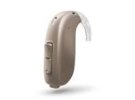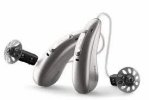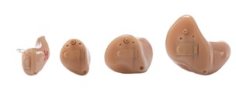I don't really have any compelling argument to give you between the Philips and the Rexton. My personal observation is that I notice a lot more question on hearing aids forums about the Philips than Rexton. However, because I wear Oticon aids, I have a bias to follow their cousin, the Philips aids at Costco, more than noticing Rexton threads, so maybe that's why I don't notice as many Rexton threads.Vol: Both the Costco Phillips 9040 and the Rexton have the same warranty and price. I'm just wondering if I should have gone with the Phillips instead, but I haven't really heard a compelling argument to do so yet.
One thing you can do, if you're curious enough, is perhaps to ask the Costco HCP whom you bought the Rexton from to let you wear the Philips 9040 around the store for 30 minutes or so for comparison. I know that 30 minutes at a Costco store is hardly enough for a real and thorough evaluation. But at least if there's a stark enough difference in the way it sounds compared to the Rexton, then maybe you may notice it right away.





